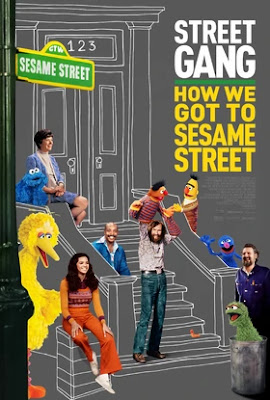Street Gang: How We Got to Sesame Street
Much like Won't You Be My Neighbor?, the documentary about Mr. Roger's Neighborhood from 2018, Street Gang: How We Got to Sesame Street takes a look at a beloved TV show for young children, and its cultural and societal impact. There are even some similarities, as both TV shows were initially spawned due to the lack of quality children's programming at the time. While Fred Rogers was disappointed in what he saw as humiliation humor in kid's TV, and wanted to create a more positive and gentle message with his show, the minds behind Sesame Street wanted to educate children the same way advertisers were handling marketing on television, with colorful images and songs.The story behind the program is mostly the story of three people - Joan Ganz Cooney (who developed the show, and came up with the idea), Jon Stone (who directed a majority of the episodes during his time with it), and puppeteer Jim Henson. Of the three, only Cooney is still alive, and the film features a number of new interviews with her, along with archival interviews and footage of Stone and Henson. According to Cooney, she wanted to create a show to reach all children, especially those in inner city areas, who often fell behind in education, and were not ready to handle school when they started. When she read about how many hours of television children would watch in a day, and happened to notice that kids knew the words to jingles in commercials like for Budweiser Beer, it spawned the initial concept for the program.The main focus on the filmmakers is the early years of the show, and its political motivations of having a diverse cast of actors with different ethnic backgrounds. One of the more interesting stories that the film shares is how the PBS station in Mississippi decided to pull Sesame Street off the air in 1970, due to its depiction of its diverse cast, and a black father figure in the form of the show's original "Gordon", Matt Robinson, who started out as a talk show host for black audiences, and found success here. (His now adult children share some very funny interviews of what it was like for them growing up with someone who was on the show they watched every day.) Due to the show's popularity with kids, local commercial TV stations started airing the program until the Mississippi PBS changed their mind, due to negative backlash from viewers. Henson, obviously, plays a big part of the story, as do some of his closest co-workers like Frank Oz, who appears only off and on through archival footage. We learn that initially, Henson's Muppet characters were not a part of the Sesame Street set with the live actors, and would only appear in separate segments. However, when the Muppet characters became the most popular segments of the show with its young viewers, they were added to the main parts of the program, where they could interact with the human characters. We get a lot of interviews with the surviving early cast members, and even some of the writers, who were mainly New York comedy writers, and had a hard time integrating educational aspects into their humor at first. There are also interviews with Joe Raposo, who composed many of the songs for the show, and some extremely hilarious outtakes where we get to hear the Muppet characters say words they don't usually say. (The film is rated-PG, so it's nothing too serious. Still, seeing Oscar the Grouch call his puppeteer a certain insult is a sight to behold.)
Street Gang takes a rather loose structure to the show's history. This is not an in depth documentary, nor does it expose any big behind the scenes drama, although it does talk about some. That's not really the focus of the film, anyway. We get a lot of highlights, get to catch up with a lot of people responsible for some precious childhood memories, and we get to revisit one of the more important episodes the show ever did, when the writers developed an episode around the death of actor Will Lee, who played shop owner Mr. Hooper. We also get some charming vignettes about children who got to perform individual sketches with the Muppet characters, and how they often acted like the felt characters they were talking to were truly alive, leading to some wonderful unscripted moments on the show.
This is an undeniably heartwarming and nostalgic film, and if it doesn't hit quite as hard emotionally as the Mr. Rogers doc did, it's only because this film is covering a much broader subject and people involved. There's still plenty of tears (seeing footage of Jim Henson's funeral still gets me), pathos, and laughs here, and more than enough fond memories from the numerous clips from the show that the film uses. For those who grew up on the show (And isn't that everyone?), this will provide some wonderful history and facts you probably did not know.












0 Comments:
Post a Comment
<< Home